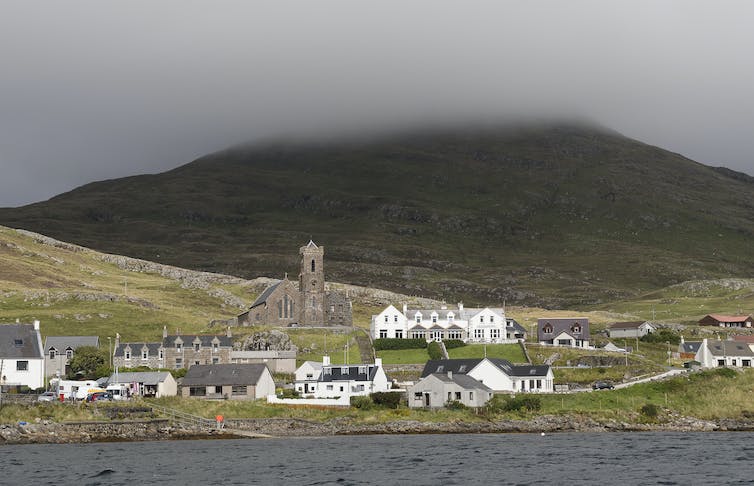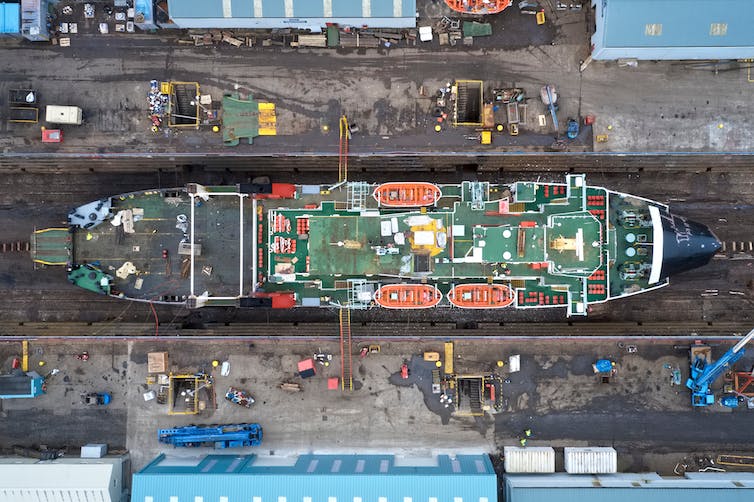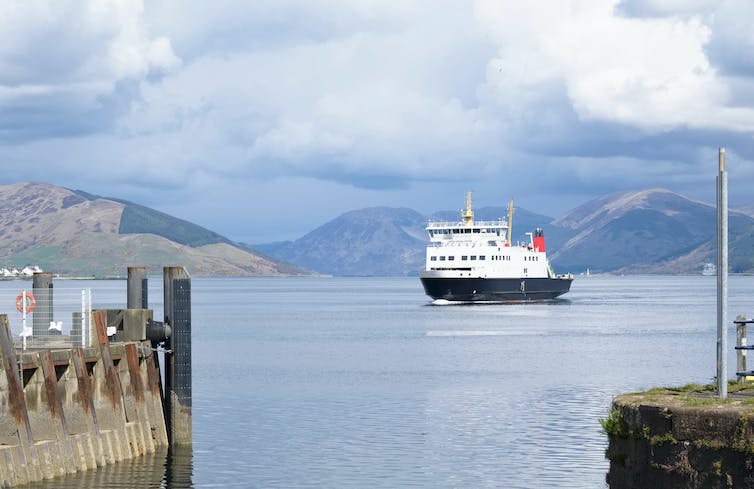A ferry serving the Outer Hebrides, within the harbour at Uig. Lukassek/Shutterstock
Scottish ferry operator CalMac cancelled all direct sailings from the mainland to South Uist, the second largest island within the Outer Hebrides, off the north-west coast of Scotland on June 1 2023. Cancellations are anticipated to final till June 30.
Disruption to ferry providers to Scottish islands has been a long-term downside. One native enterprise chief has claimed the financial affect is worse than that of COVID lockdowns.
In October 2022, 72% of sailings on the South Uist route have been cancelled, adopted by solely 4 on time sailings in November. And within the first 4 months of 2023, the cancellation charges have been 43%, 63%, 21% and 65% respectively.
On June 6 2023, transport minister Kevin Stewart, who had solely been in workplace for 2 months, resigned. His departure leaves islanders as soon as once more missing any constant help with the ferry points. Resolving it is a main problem for the brand new first minister, Humza Yousaf.
At first minister’s questions on June 8 2023, Scottish Conservative chief Douglas Ross mentioned the failures of the federal government have been “ruining lives, damaging companies, costing jobs and driving islanders to despair”.

Castlebay on Barra, with cloud descending over the hill of Heaval.
MichaelY/Shutterstock
According to the Scottish authorities’s 2019 nationwide islands plan, the Scottish isles outline how folks internationally see Scotland and “contribute massively to our nationwide identification whereas additionally preserving and selling sturdy native identities”.
Yet, the SNP authorities has allowed the island ferry community to succeed in a disaster level leaving islanders disconnected and remoted from the mainland. This raises the query of why intervention hasn’t occurred earlier.
What went mistaken
CalMac, which is owned by the Scottish authorities, is the one ferry operator within the Outer Hebrides. The firm has cited ageing vessels as the basis reason behind the continuing disruptions.
Six out of ten of CalMac’s main vessels are both approaching or past their operational life. In May 2022, the corporate reported a rise of 67% of their upkeep funds between 2017 and 2022.
Despite this ageing fleet, no new ferries have been launched since Nicola Sturgeon turned first minister in November 2014. In 2015, Sturgeon’s authorities ordered two ferries from the shipbuilding firm Ferguson Marine, however that call has been an ongoing controversy.
In December 2019, the corporate was nationalised by the Scottish authorities, after going into administration, with money owed of over £73 million. The two new ferries, which had been as a consequence of enter service in 2018 and have been reportedly on the centre of the corporate’s monetary collapse, remained solely partially constructed.
Five years on, these vessels – christened the Glen Sannox and the Hull 802 – are nonetheless not prepared. The estimated prices to see them launched at the moment are quadruple the unique £97 million funds.

Two new ferries have been underneath building for 5 years.
Richard Johnson/Shutterstock
Financial mismanagement
The Scottish authorities awarding this contract to Ferguson Marine was controversial to start with. The resolution remains to be underneath scrutiny by Audit Scotland, the general public spending watchdog.
In its March 2022 report, the watchdog discovered that in 2015, the CalMac board “had thought of there have been too many dangers concerned to award the contract”. Despite these warnings, the Scottish authorities had chosen to proceed with the deal.
The Scottish authorities additionally selected to not take motion,
in 2018, once they have been warned – by their advisors, the consulting agency PwC – of the monetary implications of the problems with Ferguson Marine.
In addition to the delays, these two new ferries have already value CalMac £1.6 million in crew prices, regardless of not but having set sail. On simply one of many vessels, 14 workers have been recruited, together with three masters, three chief engineers, three second engineers, and 5 third engineers.
Island companies, significantly in Uist and Barra, rely closely on tourism and exporting their merchandise, however this newest announcement has left them in a weak place. This solely provides to the cost-of-living disaster and the lasting affect of the pandemic. Many at the moment are left asking whether or not residing on these distant islands stays viable.

Young persons are leaving, priced out of the Hebridean housing market.
Richard Johnson/Shutterstock
Depopulation, significantly within the working-age teams, has lengthy been a problem for Scotland’s islands. Not having a dependable hyperlink to the mainland solely compounds this downside.
Over one in 4 folks (27%) within the Outer Hebrides are aged 65 or over, in contrast with the Scottish common of 20%. Between 2001 and 2021, the 25-44 age group noticed a 21.4% lower in numbers.
Many younger islanders transfer to the mainland for college and don’t return as a consequence of a scarcity of jobs and alternatives. Meanwhile, younger persons are being priced out of the native housing market. Compared with the Scottish common of 9.7%, between 2021 and 2022, home costs within the Outer Hebrides have risen by 27.7%.
Local islanders can not compete with folks shopping for second houses. In Barra and Vatersay, a couple of in ten (13.4%) of homes at the moment are second houses. Limited housing mixed with rising residing prices subsequently already make these islands a more difficult place to stay.
Resolving the ferry disaster must be a high precedence throughout the authorities’s National Islands plan, the acknowledged goal of which is to “meaningfully enhance outcomes for island communities”. But till new ferries materialise, there may be little or no consolation in first minister Yousaf’s reassurances of his authorities’s dedication to take action.
![]()
Laura Stewart doesn’t work for, seek the advice of, personal shares in or obtain funding from any firm or organisation that might profit from this text, and has disclosed no related affiliations past their tutorial appointment.
